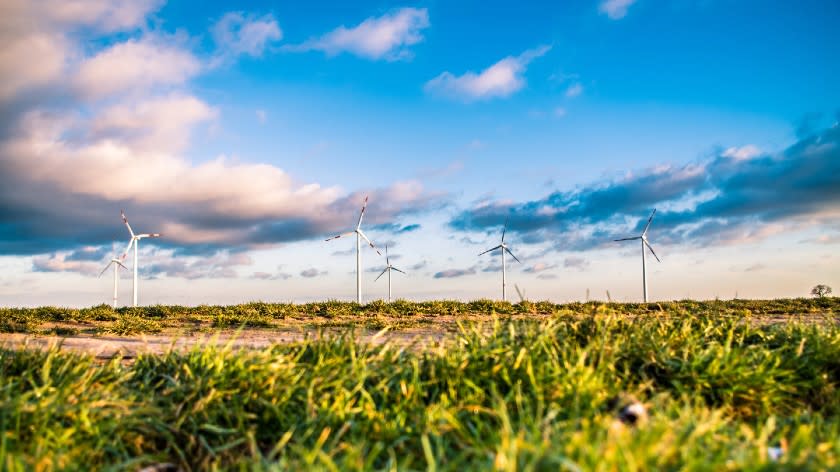Why the climate optimists are right after all


It's easy to fall into climate defeatism these days. We are heading for a 2.7 degree warmer world, according to plans submitted by governments on the eve of the Glasgow Climate Summit.
Also, no consensus seems imminent for the broad introduction of a minimum carbon price. Although it would be relatively straightforward to compensate citizens, politicians remain silent on the matter.
Then there is the news of ABP missing the opportunity, as an engaged pension investor, to make the fossil fuel industry CO2 neutral. The cheering about ABP’s exit from fossil fuels is understandable, but not justified. To get the world to stop using oil, it doesn't help if only we turn away from it, because the rest of the world will only use it more.
With this exit, ABP has given up the opportunity to force emissions reductions through the boardrooms of oil and gas companies. This is unfortunate, because the technology is basically there to make the vast majority of emissions in this industry carbon neutral. While no cakewalk, if shareholders like ABP are not at the table making demands, there will be less pressure to do it. ABP's withdrawal as an enforcer of emissions reductions is also due to the fact that the civil servants behind it do not want to receive a single penny less in pensions.After all, if a shareholder puts its foot down for more emission reductions by Shell than by competitors, this shareholder must therefore accept a lower return. This in turn means a smaller pension for the civil servants behind this fund. From what I hear from Board Chair Corien Wortmann, the answer is 'no'.
The effect of ABP's decision was immediately visible at one of the companies in its portfolio: Shell. Shell is one of the frontrunners in CO2 reduction compared to its peers. Last week, shareholder Third Point announced that it would like to see the company split into two parts. One for the investors who want to stay in oil, and one for those who believe in CO2-neutral oil production and are willing to sacrifice returns for it.Thus we see a split world in the making: fossil fuel investors who invest in fossil fuel companies to make maximum returns in a world that squeaks and creaks without oil. Sustainable investors meanwhile entrench themselves in green and clean economic activities and can wash their hands of the problem. The world's citizens are left with the damage, because CO2 emissions are not decreasing.
No one wants to feel the pain of the transition, governments think. Across Europe, politicians reacted to the energy price hikes with direct compensation of many billions for citizens. Only very sparingly was the advice from experts followed to seize the opportunity to reduce costs through, for example, home insulation.
New generation
Is everything bleak then? No, the energy transition is going to happen. Many people and companies are no longer waiting for policymakers. Natural disasters, as well as more subtle changes in the environment, are triggering change. The Chinese are enjoying the already cleaner air since coal plants started closing. The new generation is coming.The technologies are there, though they are still too expensive, not yet at scale, and certainly not yet applied to make a real impact. Yet, they are coming. The International Energy Agency (IEA) appears to have underestimated the growth of renewable energy every year. It shows that technology can scale up unexpectedly fast.
Europe is becoming a green oasis in the world. The Green Deal, even if it is still being hammered out, has set the course and it is legally enforceable. And even though we shouldn't be naive in Europe, as German economist Hans Werner Sinn rightly says, by being an example of a carbon-neutral economy, we can pull countries outside of Europe along.Sinn warns that if we stop using fossil fuels, the demand and therefore the price will fall, driving countries with less ambitious climate goals to seize opportunity to grow faster with cheaper energy. But climate economists counter that technology can quickly make carbon-neutral energy cheaper, making it competitive with fossil fuels.
In Germany, during the Energiewende (which involved the phasing out of nuclear power), Chancellor Angela Merkel subsidized solar panel technology against the market for so long that the Chinese also got away with the spoils of cheaper solar panels. Merkel had thus shown that it is possible for a country to pursue policies that end up enabling the rest of world to take steps forward.
If we want to enable renewable energy on a large scale, we are now on the eve of a historic tipping point: the question of whether to allow governments to take on green debt is being hotly debated currently in the light of the Stability and Growth Pact. Of course, this brings risks of grey-green investments slipping in, as Jeroen Dijsselbloem argued in the FD. Dijsselbloem, as chairman of the Eurogroup, experienced firsthand how debt rules could be subverted in Europe. But flexible rules for green investments can be coupled with extra strict budget rules for grey debts. The distinction can (largely) be made on the basis of the European handbook for green investments.
In any case, worrying about abuse of green debt leniency is penny wise, pound foolish, because doing nothing is extremely costly in all cases. Europe is the cusp of a sustainable future. If we don't get an alternative energy supply up and running, nobody will.
This column previously appeared in Dutch in the Financieele Dagblad of October 30, 2021